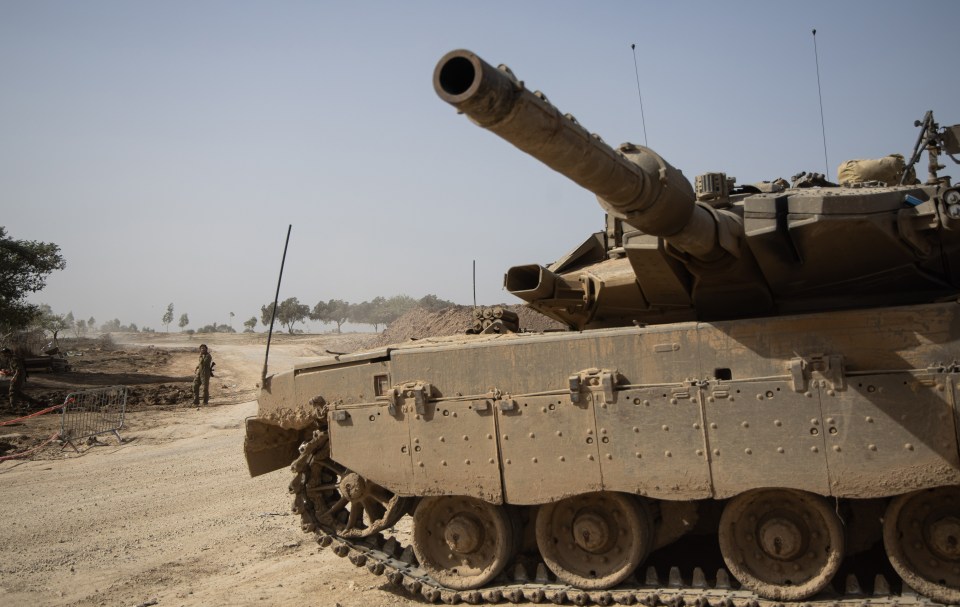HAMAS could be preparing to make its final stand in Khan Younis – the hiding spot of the terror chief known as “Gaza’s Bin Laden” after the ceasefire comes to an end.
Israel has told Gazans in Khan Younis to evacuate as it considers pushing the war south in a showdown with Hamas terror bosses.
EPAHamas could be preparing to make its final stand with a terror showdown in Khan Younis[/caption]
GettyYahya Sinwar dubbed ‘Gaza’s Bin Laden’ could be hiding in Khan Younis[/caption]
APThe war torn city has been destroyed by deadly airstrikes as residents are being urged to leave before fighting starts up again[/caption]
IDF aircrafts dropped leaflets hours after at least 32 were killed during airstrike in Khan Younis, where terrorists are suspected to be hiding hostages, including 10-month-old baby Kfir.
“Every house used by terrorist organisations will be targeted,” the leaflets read.
They advised residents to evacuate now, or “expose their lives to danger”.
Khan Younis is a giant shelter for the displaced, with twice its normal 200,000 population crammed into makeshift shelters and camps.
The refugee safe haven city is also home of Yahya Sinwar, firebrand local leader for Hamas and nicknamed “Gaza’s Bin Laden”.
Following four weeks of operations in the north, it appeared to be the first of many attacks in what Israel has labelled as a “new phase” of combat in Gaza’s southern half.
Colonel Richard Kemp, an ex-British army commander with links to the IDF, said Hamas “is in a very bad state now” and “desperate for breathing space”.
“Hamas will continue to fight, but of course many of them will try and leave – particularly the leaders,” he told The Sun Online.
“Some already have left will leave via tunnels into Egypt and escape to fight another day.
“Some will fight on, and we might see a kind of final stand of Hamas somewhere in Southern Gaza.”
Colonel Kemp said it’s likely that as Israel continues the destruction of Hamas, that some of Hamas’ terrorists will simply give up and melt into the civilian population, or even throw down their weapons and and effectively surrender.
“That, of course, leaves another problem because you’ve got radicalised terrorists among the civilian population – many of whom themselves are radicalised against Israel – which Israel will have contend with in the future,” the former army commander added.
The prospect of a showdown in Khan Younis could entail even more bloodshed in the besieged enclave, as Palestinian civilians have been left fleeing for their lives.
Families living in Gaza have been caught in the brutal crossfire, with regular accusations that the terrorists are attempting to use them as “human shields”.
Much of the northern part of the strip has been turned into a devastated warzone – with ruined buildings, dwindling supplies and horrific suffering for Gaza’s people.
During that time, over a million people from northern Gaza have fled south, following evacuation orders issued by Israeli commanders who claimed it would reduce civilian casualties.
The Red Cross estimates that some 1.5million civilians have been forced to flee south amid the Israeli onslaught from land, air and sea.
The UN on Saturday backed claims by the Hamas-run Gazan Health Ministry that “scores of people” had been killed in airstrikes on two UN-run schools in Jabaliya and Beit Lahiya.
As the six-day truce between Hamas terrorists and Israel comes to an end on Wednesday, more bloodshed is expected to take place once IDF ground forces reach south.
Despite having fewer tunnel networks than Hamas in Gaza City, the former Silk Road settlement has a warren-like old town that could serve as a citadel, the Telegraph reports.
The move can be seen as part of Israel’s five-step plan to eliminate Hamas – wiping out terror nests from north to south of the Gaza Strip.
The move would benefit both Israeli and Palestinians living in the Gaza strip, bringing them “a basic but adequate measure of freedom of movement and civil services”, Israeli outlet YNet claims.
These include health, education, water, electricity, and public sanitation.
Israel’s next key objective would be to build a heavily-guarded defence line, including a closed military zone near border inside Gazan territory.
The army would then ensure to take pinpointed military action in Gaza after the war ends to foil any terror plots or rebuilding of terrorist infrastructure.
The IDF would then evacuate the area, but the country would still focus on a full and final demilitarisation of Gaza within five to 10 years.
To achieve this “exit plan”, Israel would cooperate closely with the United States.
The Biden administration, however, has issued urgent warnings to Israel regarding the next stage of its offensive in Gaza.
The US said a campaign in the south of the strip must not be as destructive as the one carried out up north, The Hill reports
ReutersIDF aircrafts dropped leaflets telling people to evacuate Khan Younis hours after 32 were killed in an airstrike[/caption]
One of the hostages believed to be trapped in Khan Younis is 10-month-old baby KfirRex
AFPMuch of Gaza has been decimated in the fighting so far as Hamas is reportedly in a ‘very bad state’ as they plan for one last big attack[/caption]
AFPIDF troops have been seen patrolling the area in military trucks[/caption]
AFPIDF tanks are being used as troops move south through Gaza[/caption]
ReutersPalestinians in the city have used the six day truce to get in much needed supplies like fuel[/caption]
Reuters400,000 people have been crammed into makeshift shelters and camp after the city was attacked in the war[/caption]

